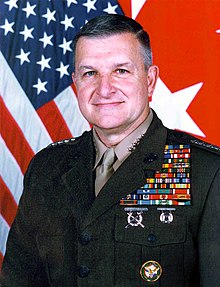Anthony Zinni
Appearance

Anthony Zinni (born September 17, 1943) is a retired general in the United States Marine Corps. He served as Commander-in-Chief of the U.S. Central Command.
| This article about a person or group of people is a stub. You can help out with Wikiquote by expanding it! |
Quotes
[edit]- I think it's (Israeli pressure for invading Iraq) the worst kept secret in Washington, everybody I talked to in Washington has known and fully knows what their agenda was and what they were trying to do; because I mentioned the Neo-Conservatives who describe themselves as Neo-Conservatives, I was called, Anti-Semitic.
- interview on the 60 Minutes, 21 May 2004
- The United Nations offers international legitimacy in what we might do.
The Battle for Peace (2006)
[edit]- Nearly four years after our country invaded and occupied Iraq, Americans are facing the painful truth that our nation has failed to achieve the Bush administration’s ambitious goals for that tragic land.
- We promised the Iraqi people freedom, democracy, security and a new and far better life.
- Yet, here we are, long and difficult years into that conflict,” ... “we still have not created the state we promised them. On the contrary, our costly and valiant efforts have produced an outcome our government did not predict or intend—a failed state spinning out of control into anarchy and civil war.
- Pages 227-228 of The Battle for Peace: A Frontline Vision of America's Power and Purpose, ISBN 978-1403971746 (released in March 2006)
Before the First Shots Are Fired (2014)
[edit]- When I joined the United States Marine Corps as an eighteen-year-old in 1961, I would have told you that wars are always decided entirely on the battlefield. That's where the generals win or lose. I retired in 2000 after four decades of service and multiple experiences in wars and military interventions. By then I had come to realize that there is more to it than that. Political decisions, intelligence estimates, strategies (or their absence), and many other non-battlefield components influenced outcomes to a far greater degree than that eighteen-year-old new Marine could have ever imagined. These off the battlefield components have become increasingly significant as each new intervention is attempted in today's complex world.
- p. ix
- How the hell did we get here?" is the question we are left with when the smoke clears. And, inevitably, the answers we get from the men and women who lead us into these commitments are laced with excuses. "We can never know how things will turn out," they tell us with a bewildered shrug. "It's the nature of war to be unpredictable." Or they say, "The burden of all our responsibilities and the crisis response timing made clear planning and actions impossible." Or, "Every war is different." These are copouts.
- p. 3


